Communications Minister Yoaz Hendel said on Sunday that although Diaspora Jews have the right to try and influence Israeli policy on matters of religion and state, he rejected such involvement for security reasons.
The minister was speaking at an event launching the new Judaism and State Policy Center at the Hartman Institute in Jerusalem, which will seek to advance liberal and pluralistic policies on matters of religion.
“I don’t like it that US Jews try to influence our policies regarding Judea and Samaria. People who don’t send their children to the army and endanger their own lives and that of their family have a lack of moral weight to say how we should act,” Hendel said during an interview at the event.
“But specifically when it comes to religion and state, they have the full right to try and influence and to be involved because this is also their home. If this is the home of the Jewish people then it is of all the Jewish people as they are, including those across the ocean.”
Hendel said that a failure to include the voices of Diaspora Jews when formulating policy on such issues would create a situation for the Jewish people similar to the historic split of the ancient Kingdom of Israel into two separate polities.
Tensions emerged between American Jewish leadership and the 2015 Israeli government led by former prime minister Benjamin Netanyahu over prayer rights at the Western Wall, conversion and other matters of religious pluralism, specifically for non-Orthodox Jews.
Intelligence Minister Elazar Stern also spoke at the event, saying that he was “against the separation of Judaism from the state but in favor of separating Jewish law from the state.
“I want everyone to get married in accordance with Jewish law; I think the state should invest in educating people to do so,” he said. “But it cannot force this, and someone who doesn’t want to should be allowed to get married in a different manner. It’s unthinkable that someone who was born [and] served in the army here [might] need to fly to Cyprus to get married.”
Turning to the issue of Jewish identity and affiliation in the US, Stern said that if he had to decide whether or not to invest in connecting Jews in the Diaspora to their Jewish community or encourage them to make aliyah to Israel he would choose the former.
“I would connect a Jew to his community there in the hope that one day he will come to Israel,” said Stern, who is a leading candidate for the chairmanship of the Jewish Agency, which deals with both aliyah and strengthening Jewish identity abroad.
The new Judaism and State Policy Center will seek to “repair the relationship between Judaism and state in Israel, and create policies of inclusive Judaism which strengthen the connection between Jewish identity and the democratic character of the country, strengthen Jewish national consciousness and the relationship with Diaspora Jewry.”
Tani Frank, an expert on religion and state issues in Israel who will head the center, said that “When we talk about ‘Judaism and State,’ we are talking about molding the Jewish public forum in Israel and the Diaspora vis-à-vis the state: not as a specific arrangement or as an issue concerning one sector or another, but as an issue at the heart of the conflict over nation and identity.”

